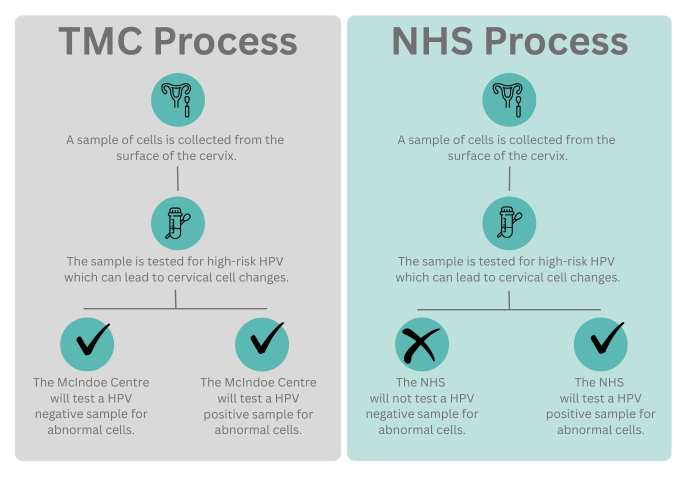Cervical screening (smear test)
Regular cervical screening is essential for protecting your health. In England cervical screening currently prevents 70% of cervical cancer deaths1.
Our Women's Health Service offers a comfortable and professional environment for cervical screening, also known as a smear test.
What is a Cervical Screening (Smear Test)?
A smear test is a simple procedure that checks for abnormal changes in the cells of the cervix (the lower part of the womb). It is designed to detect early signs of cervical cancer or precancerous conditions, allowing for early treatment and prevention.
Top Reasons Patients Choose Private Cervical Smear Tests
Reasons for Choosing a Private Smear Test
Earlier or More Frequent Screening
The NHS provides screening every 5 years for women aged 25–64. Private clinics offer the flexibility to undergo tests outside these intervals, which can be particularly appealing for those with a family history of cervical cancer or other risk factors.
Comprehensive Dual Testing (HPV and Cytology)
The McIndoe Cervical Screening performs both HPV testing and cytology (microscopic examination of cells) using the same sample, which can offer a more comprehensive assessment of cervical health. This dual approach is not standard in NHS screening programs.
How does it differ from the NHS test?
- The NHS currently uses HPV primary screening, where the HPV test is done first. Only if HPV is found during the initial test, do they check the cells from the sample under a microscope (cytology).
- In private dual testing, both tests are completed simultaneously regardless of HPV status.
Dual testing is beneficial because while HPV tests detect the virus that can cause abnormal cells, sometimes the virus might be undetectable at the time of testing even if abnormal cells are forming. Testing both HPV and cervical cells together reduces the chance of missing early signs of cervical health issues, providing extra reassurance.

Personalised Care
At The McIndoe Centre, you’ll receive expert, compassionate care in a calm and supportive environment. Our experienced GPs are here to make every step of the process as comfortable as possible, from your initial consultation to receiving clear, timely results, along with personalised guidance throughout.
Self-Referral
Unlike the NHS, which typically requires a referral from a GP, private clinics often allow individuals to self-refer, simplifying the process for those who prefer direct access to services.
How to Book your Private Smear Test
At The McIndoe Centre, we provide quick and convenient cervical screening (smear tests) with a private women's health specialist GP. Our experienced expert is dedicated to making the procedure as seamless and comfortable as possible.
What's included:
- A consultation with a GP
- Cervical screening test (checks for HPV and any cell changes)
- A follow-up letter with your results
- A letter sent to your GP (or a private referral), in case of abnormal results
Cost: £269
To book your smear, please complete the enquiry form below or contact us on 01342 488054.
What to Expect During a Smear Test?
We offer private, expert-led appointments in a welcoming environment. A smear test is a quick and simple procedure that typically takes only a few minutes.
You will be asked to lie on an examination couch with your legs bent. The Women's health specialist GP will gently insert a speculum (a small device) into your vagina to open it slightly, allowing them to access the cervix.
They will then use a soft brush to take a small sample of cells from your cervix, which may feel slightly uncomfortable but should not be painful. Some people experience mild cramping or a feeling of pressure during the test.
Once the sample is collected, the speculum is removed, and the procedure is complete. The sample is sent to a laboratory for testing, and you’ll typically receive your results within a few weeks.
Understanding Your Cervical Screening Results
You will receive your results within two weeks. Our specialist GP will call you if we have an abnormal finding and talk it through with you so you know what the next steps are.
The results are typically categorised into three main outcomes:
Normal result
If your test results are normal, it means that no abnormal changes were found in the cells of your cervix. This indicates that you do not need any further action, and you will be invited for your next screening test according to the recommended interval.
Inadequate result
Sometimes, the sample collected may not be sufficient or clear enough to give an accurate result. If this happens, you will be asked to have another test. This can be due to various reasons, such as the sample not being collected properly or menstruation interfering with the test.
Abnormal result
If abnormal cells are detected, it does not necessarily mean you have cancer. It simply means that some changes in the cervical cells have been found. Depending on the type of abnormality, further tests, such as a colposcopy, may be recommended. Colposcopy is a closer examination of the cervix to check for any signs of concern.
- HPV-positive result: If the test shows that you have high-risk human papillomavirus (HPV), the cause of most cervical abnormalities, it may indicate a higher risk of cervical cell changes. In such cases, you may be offered further testing or a follow-up screening.
If your results are abnormal or HPV-positive, it’s understandable to feel worried, but most abnormalities are not cancerous and can be easily treated or monitored. Your doctor or nurse will explain what the next steps are and support you through any follow-up procedures.
If you’re uncertain about your results or have any questions, don’t hesitate to contact us for clarification and advice.
Who Needs a Smear Test?
In the UK, regular screening is offered by the NHS to all women and people with a cervix between the ages of 25 and 64:
- Ages 25 to 64: Every five years
- Over 65: Only if recent tests showed abnormal results or if they haven't been screened since age 50
For those who prefer not to wait for the NHS appointment or want more flexibility regarding the timing and location of their screening, then our experienced team is here to support you every step of the way.
Cervical cancer
Cervical cancer occurs when abnormal cells in the cervix grow uncontrollably. It’s often caused by persistent infection with high-risk types of HPV (human papillomavirus).
Regular screening can detect early changes, allowing for early intervention and prevention. Vaccines also help protect against certain types of HPV that cause cervical cancer.
Related Videos
Specialists who offer this service
FAQs
The McIndoe Centre's GP and Women's Health Specialist, Dr Emma Sloan, addresses some common questions about our Women's Health Check.
1 Source: NHS England














